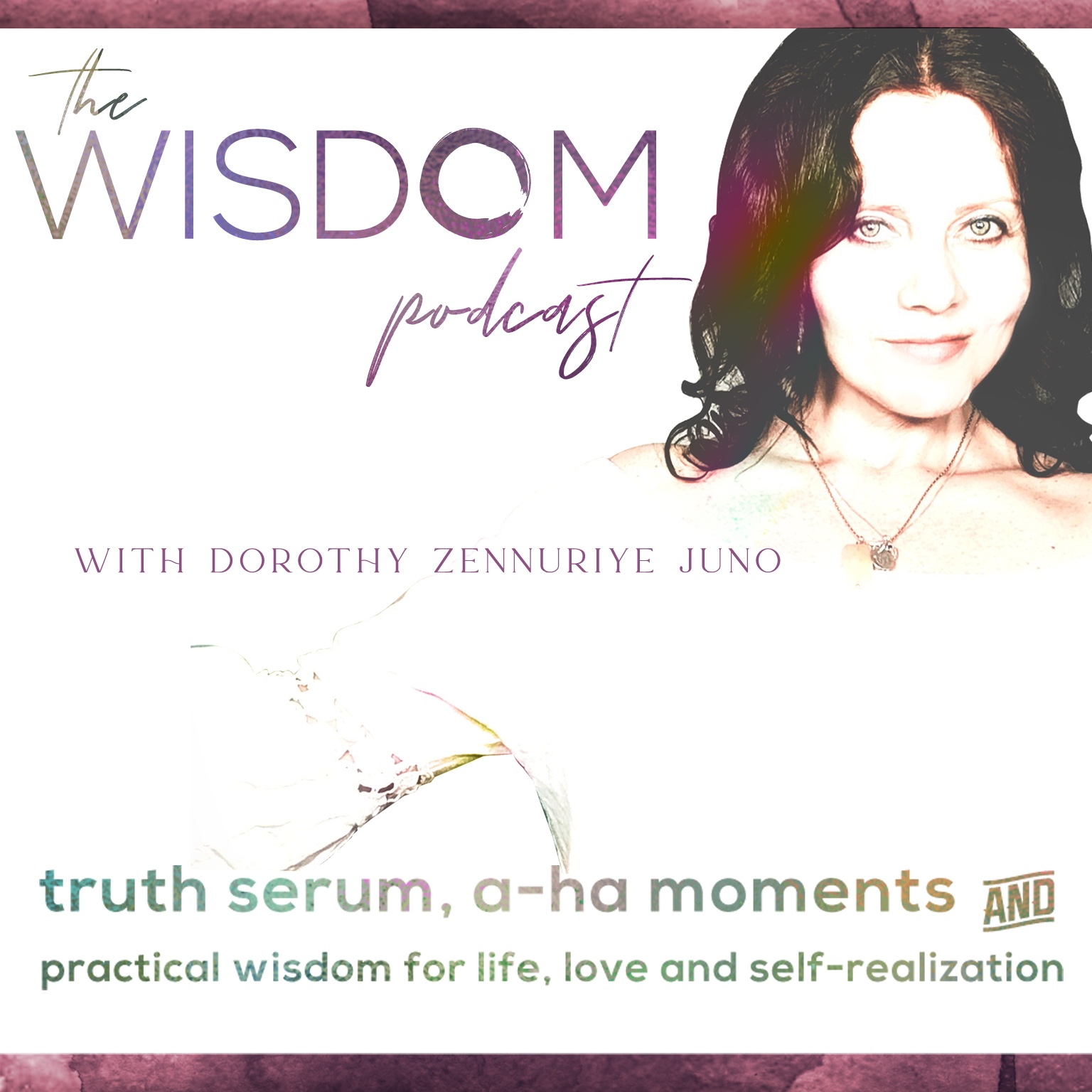Episodes
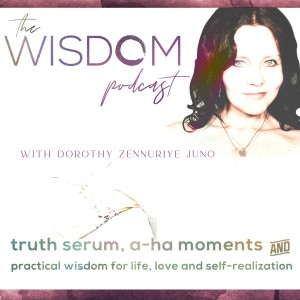
Sunday Oct 11, 2020
Real Love | The WISDOM podcast | S2 E25 | with Dorothy Ratusny
Sunday Oct 11, 2020
Sunday Oct 11, 2020
Real Love
The WISDOM podcast Season 2 Episode 25
with Dorothy Ratusny
In this episode, we dive into the many reasons why you need love; why we all go in search of it; why it becomes a deliberate focus and calling; and how it enables you to thrive; that you might step out into the world each day, knowing with certainty, that someone; that others - have your back; that you are cared for and important, and that your life matters.
Real love is different from what you typically think of when speaking about romantic or familial love.
Real love is the unconditional and continuous flow of unquestionable care; (care meaning that you care about the other person’s well being and that you hold empathy and compassion towards them for situations that may cause them to suffer); that you are kind, considerate, non-judgmental; that you are respective, forgiving (that is... not allowing someone to continue to hurt you and cause harm, but forgiving as you retain healthy boundaries and choices that honour your needs and safety); and acceptance; of validating the worth of another through your appreciation and encouragement of them because within them exists the same possibility and potential that exists within you.
The idea that we can love another human being or any living being without conditions means that another person is not required to be or do exactly as what we decide they should (or ought to). Real love is the ability to honour the goodness of another; their perfect inner nature and their ability to be love in action.
You can provide perspective, insight and honesty to another to help them on their journey; but with the understanding that they must rise up to live as their highest self by their own free will choice.
This means finding the good in those that you have easily found fault with or who have let you down; or who have willingly harmed you by their words or actions. That's quite a lot to ask of our self; to hold loving kindness towards another whom we may not even like.
In this way, love is love of the present aspects of another; it is love of humanity because we all have the capacity for goodness (even if we do not always choose this). We all have the free will choice that brings us into a state of heightened awareness and to act from this conscious and inspired state that seeks to do the right thing; to live just and honourably because that is how we ultimately feel at our best.
Witness the generosity of your spirit; that you, that each one of us is capable of; to see the good in another even as we may also witness what inner struggles and uncertainty they may also hold.
How you do this is through your conscious decision to love all living beings for their goodness; and to be willing to see the good in others even when at that very moment, they are not acting of their good.
“We all have the ability to live as love; as love in action. It begins with a choice. You must decide it.”

*If you have a question or if you would like my guidance or help, please reach out to me. You can find me at: dorothyratusny.com.
Find all Episodes here: https://www.dorothyratusny.com/wisdompodcast/
Love in your inbox? Subscribe to my weekly WISDOM Notes here:
https://dorothyratusny.us19.list-manage.com/subscribe/post?u=1052139b368be5fb71755fe5a&id=063f5bb7ca
A generous 'thank you' to Audio Engineer, Pavel Kirpikau for your incredible help! https://platosound.com/
Podcast Theme Music: 'Aura' from the Album, Illuvia by Eternell www.eternell.net/album/illuvia
Accompanying Music: Eternell - 'Resting on a Surface of a Dream', 'Still Light', and 'Inner Song'

Sunday Oct 04, 2020
Sunday Oct 04, 2020
How You Witness Infinite Beauty
The WISDOM podcast Season 2 Episode 24
with Dorothy Ratusny
‘Align yourself with your heart. This is how you witness infinite beauty.’ - dorothy ratusny
These words are a brief and beautiful summation of what you will hear in this episode.
Here I share the most simple, yet powerful means of instantly changing your perspective; your mindset and any mood or feeling that is unwanted. It is this: to hold presence and to witness the beauty in all of life circling you.
Many of the topics that I speak about in this podcast have become the poignant messages and timely topic for my videos on YouTube. It can be a helpful to have a listen here and then check out the video on this topic.
In this episode, I build further on the practice of presence that I spoke about last week; and of how you can apply this practice as a way of living life; to help you overcome feelings of anxiety and panic, anger, sadness, fear, and to help you navigate in a productive way whenever you are overwhelmed with the unknown and consistent change that continues for us all.
But here I share something new; a new approach and a best practice, to live your life, and to diminish any and all of the unpleasant thoughts and feelings that you may be mired in.
When you stop and hold presence in this moment, and as you take a mindful look around you; eyes open, senses aware and awake, you find the beauty in what you see.
Wherever you are; it could be in nature in awe of natural beauty; it could be gazing out your window, taking a few minutes from your computer to look up, to notice, to be attentive to what you are aware of; to hold presence in your mind and body to whatever is before you. The strategy; the practice is to hold presence; to allow it to reveal what you need to see; to feel; to know. That’s all.
"Holding presence is one of the most simple acts next to breathing." - dorothy ratusny
This is perhaps the most simple and yet profound means of instilling what beauty is present in each moment of life; if you choose to see it; to look for it; to appreciate it as it finds you in the most simple things. This way of holding presence allows you to feel thankful, gratitude and in appreciation of what you notice.
Finally, I would love for you to experience a guided meditation that helps you to witness the beauty in all of life. I will leave a link in the episode notes of which you can the download the meditation. This meditation titled, The Infinite Beauty Of Life: A Prose Meditation. It also lives on my website in the Wisdom Archives if you wish to listen there.
Your heart open is a simple offering of presence; of witnessing yourself and what is around you and of this moment. It is a way for you to hold peace in your heart as you make your way back into ‘now’. There is nothing else ‘to do’ except return to now.
Here in now, you might challenge yourself to find beauty – beauty in ‘what is’, not in needing anything to be different. Beauty in the simple joys of life; and the simple abundance of all that is. Whenever your mind is preoccupied with so much ‘to do’.

*If you have a question or if you would like my guidance or help, please reach out to me. You can find me at: dorothyratusny.com.
Find all Episodes here: https://www.dorothyratusny.com/wisdompodcast/
Love in your inbox? Subscribe to my weekly WISDOM Notes here:
A generous 'thank you' to Audio Engineer, Pavel Kirpikau for your incredible help! https://platosound.com/
Podcast Theme Music: 'Aura' from the Album, Illuvia by Eternell www.eternell.net/album/illuvia
Accompanying Music: Eternell - 'Melting While Falling', 'Dancing With Wind', and 'Gray Havens'

Sunday Sep 27, 2020
Sunday Sep 27, 2020

TIMESTAMPS:
Podcast Intro: 0-2:09 | Change and Free Will Choice: 2:14 | How to Begin A Practice of Presence: 5:00 | This Is What Meditation Teaches Us: 5:30 | How You Live In Presence: 7:21 | There Is So Much In Your Life To Be Thankful For: 8:39 | P R E S E N C E Doesn't Have to Be Perfect: 9:41 | The Touchstone of The Present Moment: 10:40 | A Little Back Story Of My Life: How I Practice Presence: 11:20 | The Path of ONENESS: 15:49 | An Afterward: 17:50 | Presence Gives You The Perspective 'To Be': 20:33 | Podcast Outro: 21:37

"Presence embodies both mindfulness and a meditative focus that allows the mind to witness; to be the observer of what you become aware of."
In this episode of the WISDOM podcast, I dive into the practice of presence; of what it means to experience it; of how to 'hold' presence to what is in front of you; how to become a witness to everything unfolding in the absence of judgment; and to examine presence from the perspective of your nonphysical self.
TRUTH SERUM: Presence is your witnessing of what 'is', in this moment; in both your external environment and the infinite space of what you are as you look within.
A-HA MOMENTS: To hold presence is to become a oneness with everything.
PRACTICAL WISDOM: Develop a practice of presence as you take stock in what is important right now; and as you allow everything else to be – to be right here for you when you are ready to return to it. Then slowly everything gives away as you focus on the presence of this moment.
Watch the video on P R E S E N C E in this week's WISDOM Note:

💜
*If you have a question or if you would like my guidance or help, please reach out to me. You can find me at: dorothyratusny.com.
Find all Episodes here: https://www.dorothyratusny.com/wisdompodcast/
Love in your inbox? Subscribe to Dorothy's weekly WISDOM Notes here:
A generous 'thank you' to Audio Engineer, Pavel Kirpikau for your incredible help! https://platosound.com/
Podcast Theme Music: 'Aura' from the Album, Illuvia by Eternell www.eternell.net/album/illuvia
Accompanying Music: Eternell 'Lethe', 'Haven', and 'Spiraling Light'
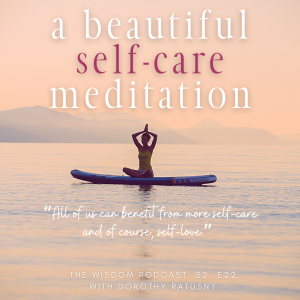
Sunday Sep 20, 2020
A Beautiful Guided Meditation of Self-Care | The WISDOM podcast | S2 E22
Sunday Sep 20, 2020
Sunday Sep 20, 2020
A Beautiful Guided Meditation of Self-Care
The WISDOM podcast Season 2 Episode 22
TIMESTAMPS:
Podcast Intro: 0-2:10 | Why Self-Care is More Important Than Ever: 2:12 | You Excel When You Live in Balance and Self-Care: 3:27 | The Self-Love WISDOM toolkit for the Best Self-Care Practices: 3:59 | Honour Your Relationship With Yourself: 4:35 | Experience the Single Most Powerful Tool to Nourish You: 5:25 | Self-Care Meditation: 6:26 | Episode Final Notes: 46:34 | Podcast Outro: 47:23

Right now and for whenever you may be listening, self-care is more important than ever. We need to know the tangible ways in which to nurture and care for our self and to know that this is an integral part of what sustains optimal mind, body, and spiritual health.
You, I, we all... have had moments where our body and mind begins to shut down, whether because of an emotional overload, or because of physical exhaustion.... yet have we done anything to circumvent this by our deliberate action; and because we have been able to sense a need and then to give that need to our self?
TRUTH SERUM: When you shut down, you may look to your well practiced vices for giving you a boost; for allowing you to numb out or escape or push past what is healthy, to continue working hard; but ultimately, and the most successful and high achieving performers in all genres of life; know this; you excel when you live in balance and self-care and the nourishment that comes with the actions of self-love. You can be performing at a high level, but still live in balance; because of care, of attending to what the body and mind and the nonphysical spirit need in order to be in harmony; and to be one.
I’ve developed an entire program – a wisdom toolkit – consisting of the best self-care practices and a self care assessment that delivers the goods on what areas of your life are in need of care and nourishment right now. It is an extensive source of guiding wisdom for you to learn and practice self-care and self-love as an essential part of life. I will leave information on this for you right here: The Self-Love WISDOM toolkit
In a time when we are being asked and indeed forced to spend more time with our self and without many of the typical distractions that cause us to disconnect, self-care is overlooked. It has not been deemed important or truly necessary – perhaps until now.
A-HA MOMENTS: Your most important relationship has always been with yourself. Discover this – honour this, learn this and you will awaken a most incredible source of wonder and inner light that you have ever known.
Here, I invite you to get started. Use this beautiful guided meditation.
PRACTICAL WISDOM: Here, you experience not only the single most powerful tool to help nourish you and to support your body’s infinite capacity for self healing and homeostatic balance, but you are guided into a journey in which to heal right now for whatever your body has needed; for whatever you have been neglecting, for what you need now.
Give yourself this time – this 30min – to witness the power of self-care through visualization, inner contemplation, and acts of self kindness and love. I will be right here with you every step of the way. Give this to yourself.
Sending you all of my love... Namaste! xo
*If you have a question or if you would like my guidance or help, please reach out to me. You can find me at: dorothyratusny.com.
Find all Episodes here or on my website: https://www.dorothyratusny.com/wisdompodcast/
Love in your inbox? Subscribe to Dorothy's weekly WISDOM Notes here:
https://dorothyratusny.us19.list-manage.com/subscribe/post?u=1052139b368be5fb71755fe5a&id=063f5bb7ca
A generous 'thank you' to Audio Engineer, P. Kirpikau https://radioplato.by/
Podcast Theme Music: 'Aura' from the Album, Illuvia by Eternell www.eternell.net/album/illuvia
Accompanying Music: 'Dancing With Wind', 'Embrace' & 'Lethe' by Eternell
Sharing the wisdom and beauty of divine love with you...
Namaste!

Sunday Sep 13, 2020
The Experience of Joy | The WISDOM podcast | S2 E21
Sunday Sep 13, 2020
Sunday Sep 13, 2020

The Experience of JOY
The WISDOM podcast Season 2 Episode 21
TIMESTAMPS:
Podcast Intro: 0-1:31 | JOY defined... 1:34 | Remember What Life Is Truly About: 2:02 | What Joy IS: 3:49 | My Hope As You Listen... 3:40 | Your Childlike Wonder: 5:40 | Connect With Your Inner Child As A Direct Path to Joy: 6:12 | How To Live Each Day In JOY: 9:54 | In Your Life Right Now, You Will Need... 11:33 | Helpful Links and Resources to Open Your Heart to JOY: 13:12 | Podcast Outro: 14:14
"Joy is a privilege that you nestle your heart into; that you live as the sweet wonder of life ever present, ever flowing. It is what you seek to live as; it is the wonder of your presence, your enjoyment, your glory, your love."
![]()
Perhaps it was the latent effects of summer as I was scripting this episode that reminded of the playful nature of our lives that is always within our reach. In this episode of The WISDOM podcast, I invite you to revisit what simple pleasures you may curate in life's daily experiences that will allow you to witness joy; to revel in its beautiful presence; calling you by name; ushering in the gentle reminder that love and joy are your eternal birthright.
Here we dive into just how joy may be witnessed in far more moments of your life; how you may easily go in search of it to fill you with wonder and appreciation, and to remind you of the importance of joy experienced often.
"Your life is meant to be joy. There is joy in appreciation so that even when things happen; as life preambles death; you can still witness the experience of joy deep within your heart. Joy is what you are each time you live out of your heart; each time you allow your heart to guide your choices and decisions." - Dorothy Ratusny
In this episode, I'd like to remind you of how simple it is to witness joy; to be joyful, to change your state of being so that you can witness life through the eyes of your childlike wonder; reminding you of what simple measures it is to witness and curate moments of joy in your life, and in the lives of others.
I'm going to leave some helpful links here to help you practice living "in joy" and to feel your heart open to receive joy. And of course, joy is always so easily found in the yearnings of your inner child; what your inner child - perhaps also your adult self, yearns for. Follow this and it will lead you into joy.
If you would like more help with this; with the witnessing of your heart open to joy; please reach out to me. I am always here to help. Namaste!
*If you have a question or if you would like my guidance or help, please reach out to me. You can find me at: dorothyratusny.com.
Find all Episodes here or on my website: https://www.dorothyratusny.com/wisdompodcast/
Love in your inbox? Subscribe to Dorothy's weekly WISDOM Notes here:
A generous 'thank you' to Audio Engineer, P. Kirpikau https://radioplato.by/
Podcast Theme Music: 'Aura' from the Album, Illuvia by Eternell www.eternell.net/album/illuvia
Accompanying Music: 'Floating', 'Shrine' & 'Mira' by Eternell
Sharing the wisdom and beauty of divine love with you...
Namaste!
More JOY! Check Out These Resources:
* Compassion IS Love: The WISDOM podcast S2 E16
* The Ultimate Self-Love WISDOM toolkit
* How to Curate 'Unleashed Joy': An Audio Blog Post
* Finding JOY: A Contemplative Meditation
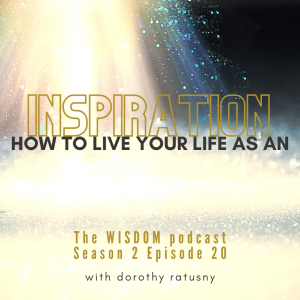
Sunday Sep 06, 2020
How To Live Your Life As An Inspiration | The WISDOM podcast | S2 E20
Sunday Sep 06, 2020
Sunday Sep 06, 2020
How To Live Your Life As An Inspiration
The WISDOM podcast Season 2 Episode 20
TIMESTAMPS:
Podcast Intro: 0-2:12 | How We Inspire Each Other: 2:13 | How Can You Become An Inspiration? 3:13 | The Questions to Contemplate to Live As An Inspiration in Your Life: 3:36 | My Client's Story: 4:38 | We Are All Being Challenged Right Now to Change For the Better: 5:44 | It Is Your Intentions That Decide What Happens Next: 7:52 | Heaven On Earth Exists If... 9:02 | Things Are Not Going Back But Forward: 11:52 | Choose To Pursue What You Love: 12:22 | Your Suggested Practice to Get You Started: 14:11 | Be the Inspiration That Others Cherish: 16:57 | Podcast Outro: 19:06
![]()
People inspire me with their incredible and yet simple acts of kindness; their willingness to live of the present moment, their courage, and what they have chosen to overcome; how they have resilience in their capacity to heal what has happened, and for being undefeated in their need for change; to evolve, to grow, to become more."
How can you begin to impact the lives of others?
How can your life become an inspiration for yourself, and for others?
In this episode we dive into all that is most important for you to live as an inspiration; in your life, for yourself and for others. This is not difficult; rather it is what aspires you to pull out the stops; to no longer wait; to be now what inspires you most.
This episode (perhaps like many others) you will want to have a notebook and pen ready; this is your strategy, your guide, the plan and path that will take you from where you are into the next level of your greatness.
Thank you so much!! Namaste!! xo
*If you have a question or if you would like my guidance or help, please reach out to me. You can find me at: dorothyratusny.com.
Find all Episodes here or on my website: https://www.dorothyratusny.com/wisdompodcast/
Love in your inbox? Subscribe to Dorothy's weekly WISDOM Notes here:
A generous 'thank you' to Audio Engineer, P. Kirpikau https://radioplato.by/
Podcast Theme Music: 'Aura' from the Album, Illuvia by Eternell www.eternell.net/album/illuvia
Accompanying Music: 'To See' by Ludvig Cimbrelius
Sharing the wisdom and beauty of divine love with you...
Namaste!

Sunday Aug 30, 2020
The Miracle of INSPIRATION + Guided Meditation | The WISDOM podcast | S2 E19
Sunday Aug 30, 2020
Sunday Aug 30, 2020
The Miracle of INSPIRATION + A Guided Meditation
Season 2 Episode 19 of The WISDOM podcast
with Dorothy Ratusny
timestamps:
Podcast Intro 0-2:10 | What is Inspiration? How do we witness it? 2:11 | What if life could be a playground of innate wonder? 3:09 | Guided Meditation of Inspiration 5:32 | Podcast Outro 32:25 |
Inspiration is what you feel through your senses; through taking in the beauty of life that you are willing to notice; and by allowing your heart open in delight, in wonder, in the deliberate choosing of your soul to be stirred; to cultivate presence, and to flow with the deliberate joy that you are witness to.
In this meditation on inspiration; the sixth and final of this Meditation Series here on The WISDOM podcast, we delve into one of the most pleasant human experiences. Together with the previous week's episodes of hope, forgiveness, compassion, self-love, and peace, inspiration illuminates the path for living from you heart; from living fluid; mind and heart aligned toward the sacred action that will manifest into form; birthing inspired thought paradigms into what creative pursuits become the beauty and inspirations of your life.
I invite you to join me for the next several moments as we settle in and as you allow your heart to live 'wide open' to the miracle of inspiration as I guide you through an experience of awakened light and conscious thought - inspired by the willingness of your soul in constant communication with you.
*If you have a question or if you would like my guidance or help, please reach out to me. You can find me at: dorothyratusny.com.
Find all Episodes here: https://www.dorothyratusny.com/wisdompodcast/
Love in your inbox? Subscribe to Dorothy's weekly WISDOM Notes here:
A generous 'thank you' to Audio Engineer, Pavel Kirpikau for your incredible help! platosound.com
Podcast Theme Music: 'Aura' from the Album, Illuvia by Eternell www.eternell.net/album/illuvia
Accompanying Music: Eternell - From the Album: 'Elysia'
'Elysia' 'Landing in Being' 'Lethe' 'Vinden Stillnar'
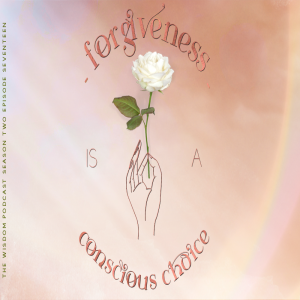
Sunday Aug 16, 2020
Sunday Aug 16, 2020
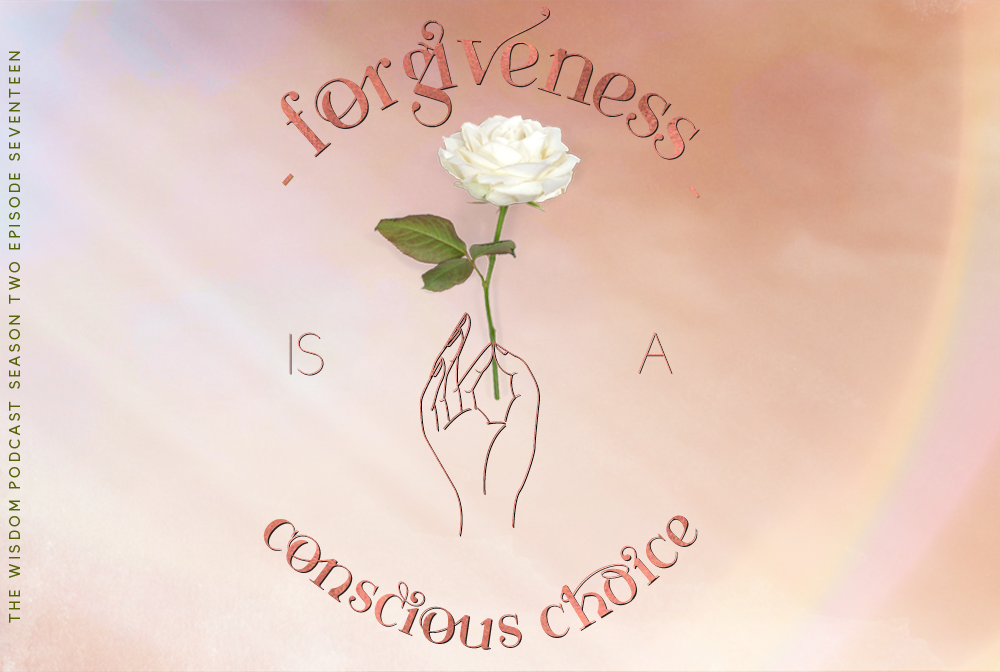
Forgiveness IS a Conscious Choice
The WISDOM podcast Season 2 Episode 17
with Dorothy Ratusny
TIMESTAMPS:
Podcast Intro: 0-1:33 | An Introduction to this Episode: Part Four in a Series of Six of Beautiful Guided Meditations: 1:14 | How Forgiveness Liberates You: 4:26 | A Prose Meditation on Forgiveness: 6:08 | Podcast Outro: 28:07

In this part four of a six-part series of beautiful guided meditations, we journey into forgiveness; we allow it to be a conscious and deliberate choice that frees us from suffering.
Forgiveness ignites the heart to heal the body because when we forgive our self and others, we clear our need for incessant thought, thought that is mired in angst; thought that holds contempt, induces sadness and despair; thought that invokes a nervous response and the bearing of inner turmoil that immobilizes our ability to function.
Forgiveness is freeing. Be clear; it is not about agreement but rather acceptance. We will be in agreement with some of our past actions or the words and actions of others, but you can acknowledge that you are not choosing to repeat this.
Acceptance allows you to find your way into change; into surrender for what you may not change, but to acknowledge that what you choose in this moment is different.
We need forgiveness to thrive; to allow old habits, mistakes, even intentional wrong doings a place to die; to be released from our ether.
Forgiveness reminds us of our ability to shed the past, not carry it; to no longer judge another or ourselves on who we were yesterday, last month or 17 years earlier. Yes, some people do repeat the same behaviours and continue to hold the same limiting beliefs, but you have a choice.
We all can choose to acknowledge what is needed; to change for the better, to be what we are all capable of; that is kindness, love, compassion, goodness and each moment of our lives we are always choosing.
My suggestion is that you choose deliberately not out of habit or as a function of going through the motions, but because you know the power of your free will choice - and you have already decided that you desire to be free; you deserve what it means to hold forgiveness in your heart for yourself; for whatever wrong doings have caused another to feel less than, diminished in importance; hurt by your actions or judgment.
You have the ability to forgive, you need to choose this first. To forgive another or yourself is to liberate you from the pain and damage of what is already past, over, complete.
Now in the present moment you will decide whether you wish to continue to bear this emotional, physical, psychological and even spiritual suffering, or if you will decide that you want to instead feel peace.
Please join me for this very special episode on forgiveness, and for the Guided Meditation that will heal your heart.

*If you have a question or if you would like my guidance or help, please reach out to me. You can find me at: dorothyratusny.com.
Find all Episodes here: https://www.dorothyratusny.com/wisdompodcast/
Love in your inbox? Subscribe to Dorothy's weekly WISDOM Notes here:
A generous 'thank you' to Audio Engineer, Pavel Kirpikau for your incredible help! platosound.com
Podcast Theme Music: 'Aura' from the Album, Illuvia by Eternell www.eternell.net/album/illuvia
Accompanying Music: Eternell - Illuvia Album - 'Isla Nocturna', 'Solace', 'Airborne' and 'Surrounded'
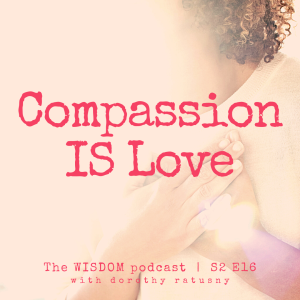
Sunday Aug 09, 2020
Compassion IS LOVE + A Guided Meditation | The WISDOM podcast | S2 E16
Sunday Aug 09, 2020
Sunday Aug 09, 2020
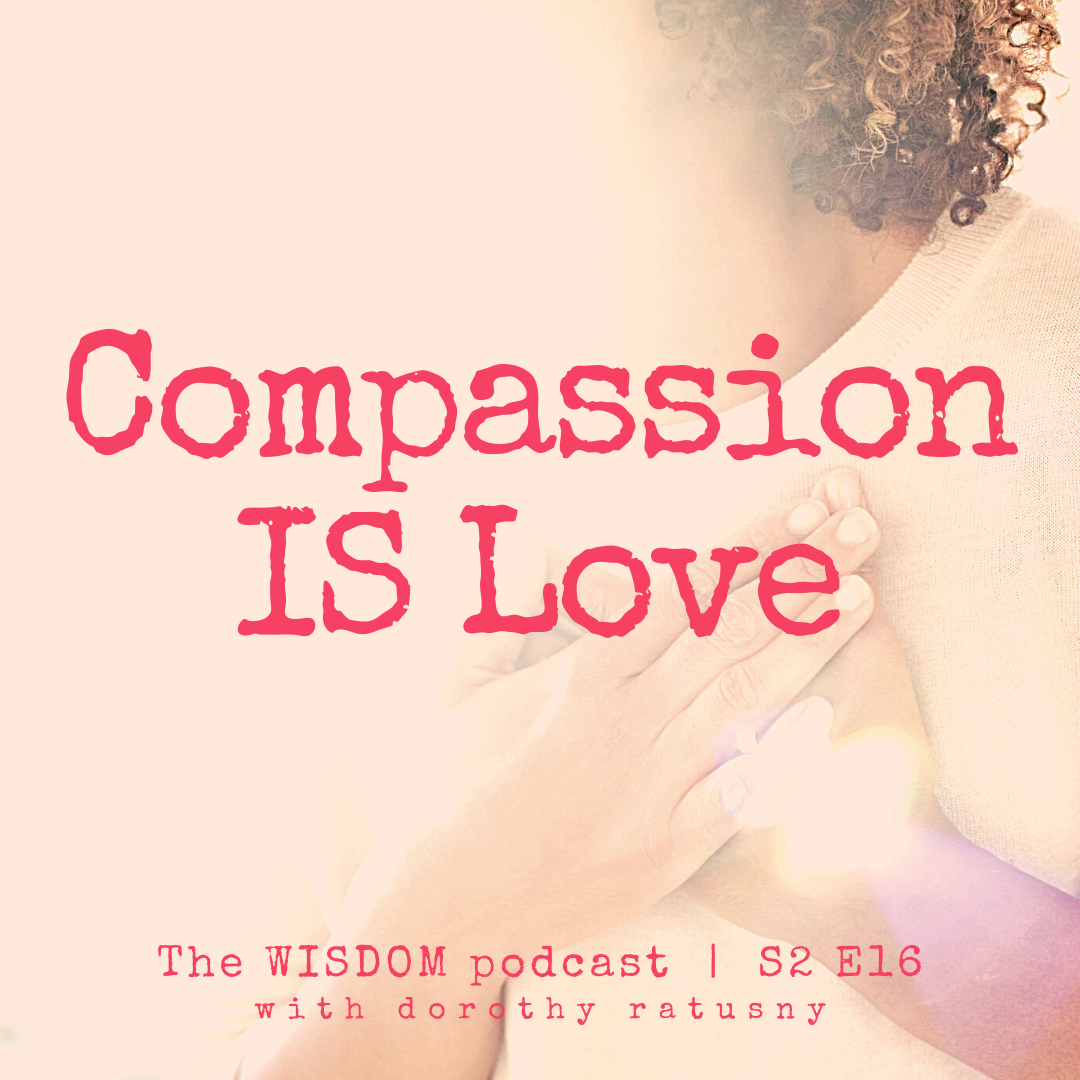
Compassion IS LOVE
The WISDOM podcast Season 2 Episode 16
TIMESTAMPS:
Podcast Intro: 0-2:08 | An Introduction to this Episode: Part Three in a Series of Six of Beautiful Guided Meditations: 2:14 | An Introduction to Compassion: 3:13 | Kindness and Love is so Powerful: 4:09 | When You Offer Yourself Compassion... 4:28 | There are Many Reasons to Practice Compassion: 5:23 | A Prose Meditation on Compassion 9:56 | Podcast Outro: 35:56

In this part three of a six-part series of beautiful guided meditations, I invite you to open your heart and your mind; to witness yourself and the world in ways that remind you of how kind and peaceful your presence can be; how soothing and comforting your actions are for yourself and others, when you choose to walk in your life with greater presence of what it means to hold compassion; to be compassionate towards yourself and all others, for this is how you are 'love in action'.
Special for this series, I have written a new meditation on the practice of compassion; and of how you may instinctively be of compassion to yourself and others.
There is no greater offering when someone is less fortunate or suffering than to be compassionate; to feel for them and their situation because this is how you offer care and kindness.
Compassion is love. It is in being compassionate that others are able to feel your genuine concern for their well being; and to hold even for a few moments, the space and the opportunity for them to know that they are not alone.
Your kindness and love is so powerful. It is this sacred action of compassion that allows others to rise up, to be heard, to heal, to take the right action for themselves.
When you offer yourself compassion, you breathe in giving yourself patience to recognize where you are in your life; and you choose to offer unto yourself this gift of kind reverence; of patience and comfort, of understanding, of reassurance that you are not alone; that you will feel better; that kindness directed within is how you help move yourself into a state of peace, responsibility to what is needed and comfort in the knowing of your presence.

*If you have a question or if you would like my guidance or help, please reach out to me. You can find me at: dorothyratusny.com.
Find All Episodes = here!
Love in your inbox? Subscribe to Dorothy's weekly WISDOM Notes here:
More Love, More Compassion...
*Check out this audio on Self-Compassion in THE WISDOM BLOG: Self-Compassion IS Self-Love
A generous 'thank you' to Audio Engineer, Pavel Kirpikau for your incredible help! platosound.com
Podcast Theme Music: 'Aura' from the Album, Illuvia by Eternell www.eternell.net/album/illuvia
Accompanying Music: Illuvia - Past Lives & Inner Worlds - Drupad
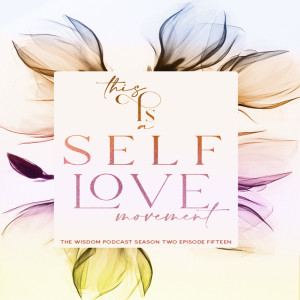
Sunday Aug 02, 2020
Sunday Aug 02, 2020
This IS a Self-Love Movement
Season 2 Episode 15 of The WISDOM podcast
In this episode, I've been inspired to share what I am naming The Self-Love Movement; because we all need to reclaim self-love; we need to understand what it means and we need to live it - as one solution for growing our confidence and self-worth and for being willing to live self-sustainably and of our ‘truth’; and in the present moment because this is how we witness our innate happiness.
Here’s an important secret: All of us face the same challenges. You might suspect that our common challenge is related to finances, or whether we are loved; or if we have the right job, or if we have chosen the best partner?
These are also challenges of the physical world that we may have made our reality.
Here’s the thing: Innate happiness is not attached to any ‘thing’. Rather it’s what you feel as you live of the present moment + this feeling is perpetuated as you make a commitment to yourself to live with your heart open, free in giving of your kindness and love to others and to yourself.
Happiness is not attached to a thing, or a person, or to you bank account; to what you own, to what you child says or does; its about acknowledging who you are; and living and loving the being that you are.
This is why we choose to do the work – the inner work – of our self. It’s to free us from harboring pain and hurt of the past; to make peace with what is; to practice acceptance of what has already happened, and to decide how we will choose to be now and in our future.
If you want to put yourself in a state of happiness, of peace, of joy; if you want to eliminate anxiety, fear, self-doubt – to feel truly alive and to honor your choices and decisions; if you really want to live "heaven on earth"; you must begin here; with what you tell yourself each day and also to make the conscious choice to be happy; among the obligations, the decision-making, of what you may have less control over, and to wake each day deciding to be grateful, to feel happy, practicing living present moment awareness and awake to all of the experiences of your life and of knowing what will allow you to be in a state of self-love – for example opening your heart by choice. Because being love is also a choice.
As you choose to live in a state of love, gratitude, and happiness; it becomes a natural outpouring of this state to be loving and kind; directed towards yourself.
You may think about self-love as taking care of your needs, of honoring and respecting yourself; of practicing loving-kindness directed within and using encouraging self-talk; but when you live in a state of love; your consciousness rises; you live in an enlightened state.
The state of love allows for you to instantly experience the feelings and the mindset of pure presence; of consciousness. It is an example of being fully in the now.
This state is what best supports you to freely feel innate happiness. This inspires every other decision and action that you make; all towards living with your heart open and of love.
Join me in this episode as I walk you through a beautiful experience of accessing this state of awareness; a state of love that will empower you to live true to yourself, and mobilize you to have the best outcomes because you are in the right mindset; you are happy, peaceful, content and grateful. This is a practice of being loving, directed towards yourself. Namaste!! xo
* The link to the VIDEO of 'This IS a Self-Love Movement' is here: https://youtu.be/TKXRISWlvoQ
Please check it out! Namaste! xo
If I can be of any help to you on your personal journey, please reach out to me.
You can best find me at www.dorothyzennuriyejuno.com
Find all Episodes here: https://www.dorothyratusny.com/wisdompodcast/
Love in your inbox? Subscribe to Dorothy's weekly WISDOM Notes here:
A generous 'thank you' to Audio Engineer, Pavel Kirpikau for your incredible help! https://platosound.com/
Podcast Theme Music: 'Aura' from the Album, Illuvia by Eternell www.eternell.net/album/illuvia
Accompanying Music: Eternell, 'Kalimba', 'Floating', 'Haven' & 'Spring Light'
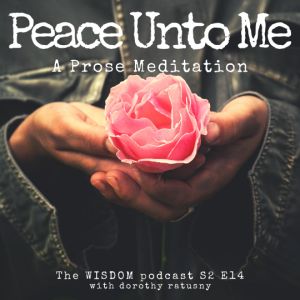
Sunday Jul 26, 2020
Peace Unto Me: A Guided Meditation | The WISDOM podcast | S2 E14
Sunday Jul 26, 2020
Sunday Jul 26, 2020
Peace Unto Me: A Guided Prose Meditation
Season 2 Episode 14 of The WISDOM podcast
Sometimes the feeling of compassion can cause you to well up with emotion to feel incredible sadness and sorrow; but it is in those moments that you also fill your heart with infinite love for another or for a situation.
Please don't shy away from evoking compassion. We all need to feel one another's compassion.
For the next six weeks, join me in a series of guided meditations that will guide you into yourself; into peace, self-love, compassion, forgiveness, hope and inspiration.
You will need each of these as you hold presence unto yourself in this brave new world and as you call upon a gentle witnessing of your heart - here in the moments now that will determine for you a most blissful and certain life.
I invite you to close your eyes with me for a short time and take in this experience; each meditation is delivered in a 'prose' format which makes it simple to take in my words; you don't need to have any experience in meditation to feel the effects of this practice. Simply allow the words you hear to find their way into your heart.
Let them fill you with love and support.
Join me for this first prose meditation: 'PEACE UNTO ME'.
I will leave a link for you here, to where you can experience this meditation unto itself.
If I can be of any help to you on your personal journey, please reach out to me.
You can best find me at dorothyzennuriyejuno.com
Find all Episodes here:
Love in your inbox? Subscribe to my weekly WISDOM Notes here:
A generous 'thank you' to Audio Engineer, Pavel Kirpikau for your incredible help! https://platosound.com/
Podcast Theme Music: 'Aura' from the Album, Illuvia by Eternell www.eternell.net/album/illuvia
Accompanying Music: Eternell 'Dancing With Wind'
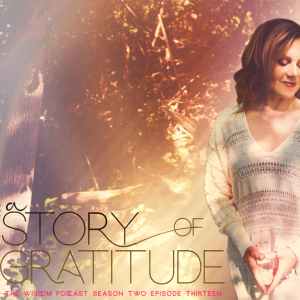
Sunday Jul 19, 2020
The Story of Gratitude: My Story | The WISDOM podcast | S2 E13
Sunday Jul 19, 2020
Sunday Jul 19, 2020
The Story of Gratitude: My Story
Season 2 Episode 13 of The WISDOM podcast
with Dorothy Ratusny
This is a story of gratitude. This is my story. I hope that in sharing it with you it inspires you to see the world through eyes of hope, love; and with forgiveness and acceptance of what is, and of course gratitude for the many blessings that life offers you as you choose to forgo the labels of right or wrong; good or bad and to instead consider each experience as important and of meaning. This will help you to find deeper significance and meaning in it this way.
This part is the story is the part of acceptance; of allowing for what has already happened; without blame and finger pointing; without the need to have answers, but instead to seek to understand from a perspective of what choices you now have as you comprehend what is most important now.
I chose to hold gratitude for what I had control over; that is what I would be able to do from that moment forward. I chose to heal completely; to have gratitude for my life and for being here; and for choosing to experience what my life is now; as important and meaningful. I chose to learn from this experience; to decide what I was being shown to look at and change; to be the best version of myself possible.
My life has forever changed since this story; everything has been for the better; to remind myself that the life I lived up until that moment was no longer the same life. When we focus only on what is in front of us, we can lose sight of what we are still manifesting and we become distracted and discouraged.
As I took each step forward, there were many opportunities to be grateful. Gratitude reminds us of what good we can pay attention to that we might otherwise take for granted. Without gratitude there can be a tendency to wallow, to disapprove, to be a victim. This does not help your capacity for what is most wanted.
For a PDF that you can download with Tips and Best Practices for your written Gratitude Practice, click here:

*If you have a question or if you would like my guidance or help, please reach out to me. You can find me at: dorothyratusny.com.
Find all Episodes here: https://www.dorothyratusny.com/wisdompodcast/
Love in your inbox? Subscribe to Dorothy's weekly WISDOM Notes here:
Podcast Theme Music: 'Aura' from the Album, Illuvia by Eternell www.eternell.net/album/illuvia
A generous 'thank you' to Audio Engineer, Pavel Kirpikau for your incredible help! https://platosound.com/
Accompanying Music: Eternell 'Begin Again' and Purl ' Terra Lumina'

Sunday Jul 19, 2020
'Unleash Yourself' | The WISDOM podcast | Season 2 Episode 11
Sunday Jul 19, 2020
Sunday Jul 19, 2020

Unleash Yourself
Season 2 Episode 11 of The WISDOM podcast
with Dorothy Ratusny
It is most fitting at this time to share this - this prose. It was written two years to the day that I am recording. It fits beautifully with what we are all called to do at this time; to awaken our senses; to step into a greater consciousness that we might uphold for every decision, every action, every thought that we hold. It is each one of us that chooses whether we will live from our heart and with this to embrace all of our perfect nature; to rise up; to meet our self in this perfect state as pureness of thought, without the conditions that we have once placed onto our self and with using our free will to always choose from our heart, of what is right and true - to live a bountiful and beautiful heaven on earth, here and now.
For wherever you are on your path at this time and as you continue to uphold the most sacred values; let this message inspire your journey, now and always... Namaste!

TRUTH SERUM: To 'unleash' yourself is to allow yourself the freedom of self-expression through creativity, love, kindness and compassion. It is to never hold yourself back from life's constant outpouring.
A-HA MOMENTS: Embrace the power you hold within; go into this power - this truth - this security - this comfort; it exists within you; find it as love, find it as inner strength, find it in the deliberate calling of your nature - what you are. When we make time to embrace our inner being we feel comforted in the knowledge that we are not alone; that we are never without knowledge and true wisdom that guides us in every moment. Unleash this knowledge, this inner knowing as you fill yourself - your heart - your being - with this beautiful truth.
PRACTICAL WISDOM: Follow the inner yearning of your soul - unleash your truth - be inspired by what you find and step forward into this. this is your life's path unfolding; be on it - enjoy it - trust it wholly.

*If you have a question or if you would like my guidance or help, please reach out to me. You can find me at: dorothyratusny.com.
Find all Episodes here: https://www.dorothyratusny.com/wisdompodcast/
Love in your inbox? Subscribe to Dorothy's weekly WISDOM Notes here:
https://dorothyratusny.us19.list-manage.com/subscribe/post?u=1052139b368be5fb71755fe5a&id=063f5bb7ca
A generous 'thank you' to Audio Engineer, Pavel Kirpikau https://platosound.com/
Podcast Theme Music: 'Aura' from the Album, Illuvia by Eternell www.eternell.net/album/illuvia
Accompanying Music: Eternell 'Imagined Distances'
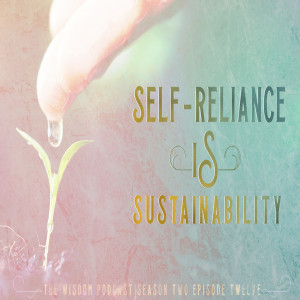
Sunday Jul 12, 2020
Self-Reliance IS Sustainability | The WISDOM podcast | Season 2 Episode 12
Sunday Jul 12, 2020
Sunday Jul 12, 2020
Self-Reliance IS Sustainability.
“It’s what you must think of now.”
Season 2 Episode 12 of The WISDOM podcast
with Dorothy Ratusny
Self-reliance is having confidence in and exercising one's own powers or judgment. In fact, that is how we all need to live.
Sustainability refers to a lifestyle that involves the use of sustainable methods / of harvesting or using a resource so that the resource (and this resource could be ourselves), that is not depleted or permanently damaged.

TRUTH SERUM: “There will continue to be uncertainty. You must become certain about what you want and how you wish to live your life. This time is a time of freedom – freedom from what has held you hostage from yourself. What you will choose to be a new set of practices and beliefs that you will hold; will allow you to rebirth yourself into something more, something better. You need this time to awaken; to set in motion this new stage of your life. You already have everything that you need for this.”
A-HA MOMENTS: In this brave new world we are living in, we are being challenged to examine what has been a pattern of reliance on structures, protocol, process, of external powers and condolences and of continuing to do what civilization has done since the industrial revolution. We have followed a model that has not always been self-sustaining nor healthy for ourselves and for the planet.
PRACTICAL WISDOM: Yes, you have every right to have what you want in life; but are your desires to have more and better based on an ego-driven response and fuelled by competition, power and privilege; or are you making decisions that take into consideration your needs based on sustainability, conscientious and thoughtful decisions, humane, ethical, and kind practices?
For a PDF list of the questions I ask in this episode: please click here:

*If you have a question or if you would like my guidance or help, please reach out to me. You can find me at: dorothyratusny.com.
Find all Episodes here: https://www.dorothyratusny.com/wisdompodcast/
Love in your inbox? Subscribe to Dorothy's weekly WISDOM Notes here:
A generous 'thank you' to Audio Engineer, Pavel Kirpikau for your incredible help! https://platosound.com/
Podcast Theme Music: 'Aura' from the Album, Illuvia by Eternell www.eternell.net/album/illuvia
Accompanying Music: Eternell 'Gray Havens' and 'Dancing with Wind' from the Album: Imagined Distances

